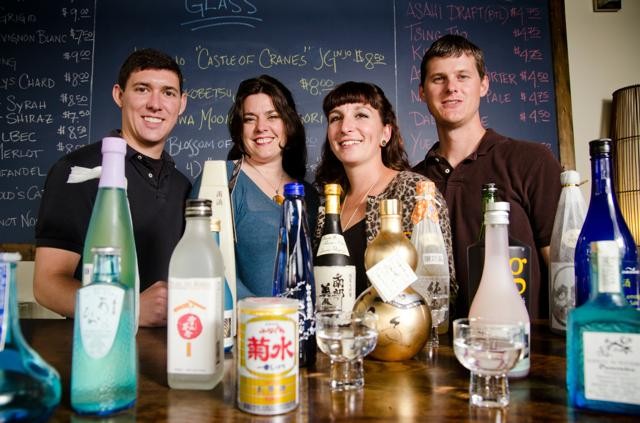Like the fermented beverage it serves, Blue Kudzu Sake has developed over time.
The plan for the nation's fourth independent sake brewery (as the owners slate it) began in 2011. Two years later, the sake finally is flowing in the River Arts District.
Blue Kudzu will begin as a bar and restaurant, and as the owners secure the necessary permits, they'll begin brewing their own sake, a potent drink made from fermented rice, often called "rice wine," although that term isn't entirely accurate — the brewing process is more akin to brewing beer.
Not familiar with sake? That's kind of Blue Kudzu's raison d’être, explains Cat Ford-Coates, one of the business' four co-owners. The bar features four sakes by the glass (also available as a flight) and 46 bottles, a cross-section of the many styles of sake.
"As far as the by-the-glass list goes, it's trying to give you that initial 'your first class' without actually having to take a class," Ford-Coates says. "There's four different styles of sake, and they're all very different."
Co-owner Mitch Fortune says the sake offerings have been selected with accessibility in mind. "We want people to come in and explore, learn about sake, and once we're brewing, we'll kind of show them how it's all done," he says. "We tried to demystify everything by putting the translation name, so people, if they're not comfortable with saying Kikusui Funaguchi Honjozo Nama Genshu, people can say, 'I'd like to try the White Snow.'"
Since sake is made from rice, it can have an earthy flavor, Fortune explains. Alternatively, it can taste like vanilla and rum — the flavor profile depends on the rice that was used to produce the sake.
Sake rice gets milled before it's processed. The amount of processing the grains undergo — how much of the rice's hull is removed — significantly influences the flavor.
"The more they're refined, they're getting down to that starchy core, so you're getting a cleaner product, if you will. When you go for the Honjozos, Tokobetsus and Junmais, they tend to be a lot more rice-forward," Fortune says. "They have a lot more ricey flavors to them. When you get into the Ginjos, you run the gamut from that rice-forward all the way up to hints of anise and mint and eucalyptus."
For the highest grade of sake, seek out a Daigingo. "You get into a very clean alcohol," Fortune says. "You get a lot more into the nuances of white chocolate and all these real subtle flavors that would normally be covered up by a more ricey, lower-quality sake."
To truly grasp the differences between the sakes, try several. Flights of sake, which include four small pours for about $14, have been designed with education in mind. "To run the gamut helps our guests to define their palates," Ford-Coates says.
Blue Kudzu also seeks to redefine the way visitors think about sake and food. The drink can accompany far more than sushi, Fortune explains. "You can pair it with almost anything," he says. "As far as the menu, we wanted to have some spicy stuff, some sweeter stuff, some lighter stuff. It's kind of just our favorite things of pan-Asian cuisine."
Small plates include house-made pork gyoza (dumplings), a trio of different varieties of kimchee and deviled tea eggs. The entree offerings are few but satisfying: beef pho from Pho Ya Belly food truck (where Fortune used to work) and a stack of sashimi-grade tuna, avocado and mango.
At the moment, nothing on the menu costs more than $12. "We tried to keep the price point as far as food more reasonable because sake is expensive," Fortune says.
Although, just how expensive depends on the variety. At Blue Kudzu, a glass of sake costs about $7, and bottles run $14 to $280 (for a limited-edition of Hideyoshi Flying Pegasus Koshu that Ford-Coates expects will be out of stock before this article prints).
Blue Kudzu Sake, 372 Depot St., opens Tuesday through Thursday from 5 to 10 p.m. and Friday and Saturday from noon until 11 p.m. For more information, visit bluekudzusake.com.




Before you comment
The comments section is here to provide a platform for civil dialogue on the issues we face together as a local community. Xpress is committed to offering this platform for all voices, but when the tone of the discussion gets nasty or strays off topic, we believe many people choose not to participate. Xpress editors are determined to moderate comments to ensure a constructive interchange is maintained. All comments judged not to be in keeping with the spirit of civil discourse will be removed and repeat violators will be banned. See here for our terms of service. Thank you for being part of this effort to promote respectful discussion.